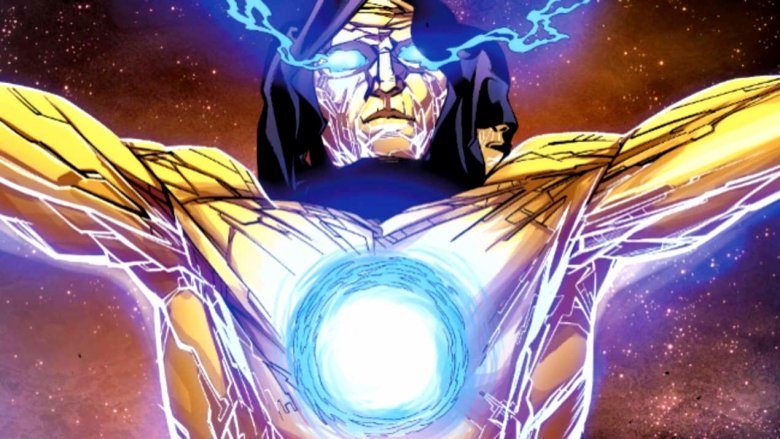The Major Character Marvel Cut From Infinity War And Endgame
The struggle against Thanos may have gone a bit differently if screenwriters Christopher Markus and Stephen McFeely had gotten their way. In a New York Times interview, the pair revealed that they almost introduced a decades-old Marvel character in Avengers: Infinity War — one with vast cosmic powers.
In fact, that may be understating the case just a bit: the character in question is the multidimensional entity known as the Living Tribunal, and the scope of its powers over the multiverse are pretty much impossible to overstate. It first appeared in 1967's Strange Tales #157, at a time when that book was being shared by the odd couple of Doctor Strange and Nick Fury, Agent of S.H.I.E.L.D. Unlike nearly every other character in Marvel lore, the Living Tribunal is a singular entity, having no alternate counterparts in different universes. Instead, it has dominion over the entire Multiverse, and its power and authority is second to only one other one entity: its creator, the One Above All, which also created the multiverse and everything in it.
The Living Tribunal is usually depicted as a giant, golden, humanoid figure with three faces, each one representing a different aspect of the being: Equity, Necessity, and Vengeance. These three facets were represented throughout different universes by the manifestation of cosmically-powered, near omnipotent beings; for example, in the mainstream Marvel continuity, Equity is represented by the planet-eater Galactus, Necessity is represented by the cosmic entity Eternity, and Vengeance is represented by Death (the very same death whom Thanos was attempting to win the affections of in the comics' Infinity Gauntlet event). The Tribunal seeks to maintain balance and order throughout the entire Multiverse, and all three of its faces must agree that action is necessary before it will intervene in the affairs of mortal beings — but once it does decide that intervention is in order, its authority is absolute, with even the likes of Celestials and "abstract" entities such as Lord Chaos and Master Order being bound to comply.
It's pretty heady stuff, but it's easy to see why Markus and McFeely may have felt that the introduction of the character would be appropriate during the events of Infinity War, what with Thanos endeavoring to wipe out half of all life in Earth-199999 (the numerical designation bestowed by Marvel's powers that be on the Marvel Cinematic Universe). But given that that movie and Avengers: Endgame were already stuffed to the brim with characters and plot machinations, it's equally easy to see why Marvel Studios would nix the idea — although, intriguingly, the pair seemed to suggest that head honcho Kevin Feige might have had a different reason for wanting to omit the character. Namely, to save it for a future film.
Asked if there were any characters the duo wanted for Infinity War and Endgame that they couldn't have, Markus said, "We did try to put the Living Tribunal in the first movie. We wrote a scene in which he appeared during the Titan fight. And everyone was like, what?" McFeely continued: "Whoa. He's got three heads. It would indicate a whole different level of architecture to the universe and I think that was too much to just throw in."
We should say so: the brawl between Thanos and members of the Guardians of the Galaxy and Avengers on Titan was eventful enough, and the sudden appearance of a heretofore-unseen, golden god of a being with three faces just might have thrown a few moviegoers for a loop. However, Markus then went on to say, "The idea's still in Kevin [Feige]'s court," with McFeely lamenting that they probably just dropped a spoiler. Markus then suggested that the entity could perhaps have his own streaming show, with McFeely proposing something similar to Judge Judy.
We think perhaps that the pair were hamming it up to cover for the fact that they had indeed blabbed a bit too freely, because we can think of the perfect vehicle for the Living Tribunal to receive a proper introduction to the MCU: The Eternals, which deals with a race of immortal, superpowered beings created millions of years ago by the Celestials, and tasked with defending the Earth from their nefarious counterparts, the Deviants. That movie promises to expand the cosmic side of the MCU in an unprecedented fashion; Feige has said that its plotline might cover thousands of years, and its characters are bound to have a more-than-passing familiarity with the cosmic and "abstract" entities which fall under the Living Tribunal's authority. In fact, it's safe to say that the being's appearance in Eternals would seem far less out-of-place than if it had just dropped in from out of nowhere to give the good guys an assist in Infinity War, although it might have been helpful if it had simply decreed that Star-Lord was not, under any circumstances, to sucker-punch Thanos, and then just left.
At any rate, Markus and McFeely are obviously full of more ideas than can even be contained by two of the biggest event films of all time, so here's hoping that Endgame doesn't represent their MCU swan song. They certainly haven't done anything to endanger their hallowed position within Marvel Studios: the six films they've written (all three Captain America movies, Thor: The Dark World, Infinity War, and Endgame) comprise over a quarter of the MCU's entire output, and have made pretty much all of the money.
Avengers: Endgame is in theaters now.
